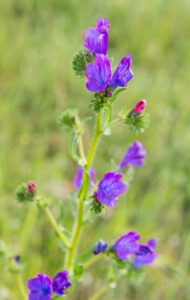For those who want to follow the sordid details of the former Member for Wagga Wagga, Mr Darryl Maguire’s shenanigans while he was a Liberal Party member of the NSW Parliament there is plenty in the media about his questioning before the ICAC that I need not repeat, including his close relationship with the Premier.
However, when his conduct forced his resignation from Parliament, at the 2018 by-election, Joe McGirr was elected. Joe was then easily re-elected at the 2019 poll. Joe is an Independent, and first challenged Maguire in 2011 with his major policy to upgrade the local hospital. He achieved a swing against the entrenched member Maguire who was, at that stage, the Liberal Party Whip; the miasma had yet to rise and cloud his parliamentary career. Joe had not stood in 2015.

Joe McGirr has a strong ALP connection and his great-uncle was Premier of NSW. His grandfather was Minister of Health in NSW when James Dooley was Premier. Joe is resolutely independent and has resisted blandishments to join any Party.
Joe McGirr came to Wagga Wagga as a junior doctor and remained there, undertaking a number of roles. He is married to Kerin Fielding, the first female orthopaedic surgeon in NSW (and only the third in Australia in what is very much a male club). They have four adult children.
Dr Fielding is a cordon bleu cook, and she and Joe have a retreat in the south of France, which unfortunately I have not savoured.
Over a period of time I have had contact with Joe, as I undertook a number of jobs in Wagga Wagga, and I encountered him from the time he was a young doctor on the way up. During the time when the first rural clinical school was being planned in Albury and Wagga Wagga, which had its moments because of the traditional rivalry between the two cities, Joe was always eager to assist. It was unsurprising when he became Associate Dean of the then new Notre Dame Medical School.
Joe has been reported as saying that: “My views on social justice were formed by the Jesuits during my education, with the Jesuit approach linking justice to action and love. I have seen through my work, many areas of rural disadvantage that create problems for the whole of society as well as those directly affected. Social justice is an important part of our medical program and should be a part of every doctors calling.”
This view on social justice has been translated across into his diligence in parliamentary life.
With Joe, you know what you’ll get. Brutally honest, in a sea where there so much parliamentary squalor, just look at whom he replaced. A premier swain, no less – and high on the Dodge.
The problem with anybody who runs as an independent for parliament in a country electorate, it helps if you have local “cred”; for Joe it counted for a little at the first tilt, but not enough.
He persisted.
When I have advocated for an Integrity Party, sometimes you wonder if you talking to an empty stadium. However, Joe McGirr is a very useful role model for future candidates, even if he is an avowed Independent.
Oh, by the way, his first major electoral policy has been accomplished. And there is more – the local Wagga Wagga hospital has reached stage 3 of its redevelopment.
A Casual Comment which the Conservatives will probably ignore – for the time being
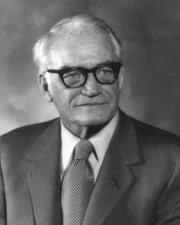
In 1995, Barry Goldwater warned the GOP that they would rue the day they welcomed the religious right into the party.
It is a pity it took him until he was 85 years old to say that.
However, maybe an Australian somebody of a similar age in the appropriate part of the Australian spectrum will have the guts to say that – because in the end ignoring the Goldwater axiom will savage the credibility of genuine conservatives.
David Owen visits
In 1982, the Australian Institute of Political Science (AIPS) reached its fiftieth anniversary. The Institute published the Australian Quarterly and held annual Summer Schools where people from all sides of the political spectrum used to gather to mingle socially and discuss matters politic.
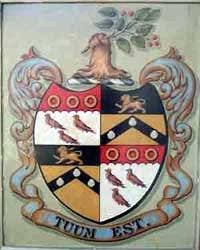
Norman Cowper was one of the founders of the Institute. Of the pioneer families five – the Cowpers (arrived 1809), the Streets (1822), the Stephens (1824), the Windeyers (1828) and the Fairfaxes (1838) have produced representatives, prominent in public life, over the succeeding four or five generations.
Thus Norman Cowper, a lawyer in one of the biggest Sydney law firms, was hardly a radical. However, in the 1930s he was very concerned with the rise of fascism, as he was of communism. In founding the AIPS in 1932, he saw it as a bastion for the political centre where the reasonable left and right could converse across the policy divide. Therefore, the Board and contributors represented both sides of the political spectrum – then United Australia Party and the Australian Labor Party. Gough Whitlam used the Summer School to test some of his policies in the years running up to the 1972 election.
While the AIPS was Sydney-centric, it had a Melbourne Committee. However, it was not until I moved to Sydney that I was asked to join the AIPS Board. The Institute survived on modest grants from some of the large companies and the proceeds of the Summer School. However, by the 1980s as politics became more ideologically driven and coverage of politics in the media expanded, the influence of the AIPS began to decline.
Although we did not know it at the time, the fiftieth celebration was the last hurrah for the bipartisan flavour that the Institute had attempted to inject into public debate. I was entrusted with organising the anniversary.
Norman Cowper was 86 at the time, and everybody wanted him to be there. The family was enthusiastic and so it was important that the anniversary honoured him. However, I had the disadvantage of being a newcomer to the Board, essentially an outsider who had to work around the sensitivity of a Board that had known better times. The sun was setting on what the Institute had been constructed to be, a bulwark against the extremes in politics.
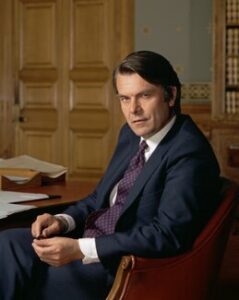
At the time of the celebration it was before the Falklands war, Thatcher was on the nose and Reagan was still to make his impact. I thought that it would be an idea to have speakers from each of the decades. David Owen, as co-founder of the newly-created Social Democratic Party, provided a model of the centre. He was a doctor, and he was friendly with a prominent English surgeon who I had met the previous year. I was able to enlist his support in having David Owen accept the invitation.
Unlike speakers today, David Owen did not charge for his attendance and through my contacts, a first-class airfare was arranged gratis; that left the Institute to pay for his accommodation.
I had the idea of having a relevant speaker for each of the decades from the foundation of the AIPS to describe what was happening in terms of the politics and policy.
The speakers were Nugget Coombs, Bill Snedden, John Button, Anne Summers and Patrick Cook, with Max Walsh as the Master of Ceremonies. The talks, including the inaugural Cowper Oration given by David Owen, were scattered across the dinner which was held at the University of Sydney.
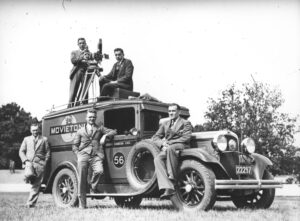 In addition, I persuaded the guys at Movietone, who had their archives in Balmain at the time, to put together a traditional newsreel, together with the highlights of 50 years. So it was a jampacked evening. Anne Summers was a great help in getting the program together, particularly persuading Nuggets Coombs to reminisce on the 30s and Patrick Cook to round up the speakers’ list.
In addition, I persuaded the guys at Movietone, who had their archives in Balmain at the time, to put together a traditional newsreel, together with the highlights of 50 years. So it was a jampacked evening. Anne Summers was a great help in getting the program together, particularly persuading Nuggets Coombs to reminisce on the 30s and Patrick Cook to round up the speakers’ list.
I remember asking Paul Keating whether he would attend, but anybody – no matter who they were who deserted the Labor Party – was a “rat”. David Owen had been elected as Labor Party member for Plymouth Devonport and was part of the “Gang of Four” that had broken away from the Labor Party in 1981, and at the time of the Oration he was very much the flavour.
We were both doctors. We spent an interesting week together, and he told me that he had not had a better “minder”, but I said I had done it before – and had learnt a great deal about being the essential shadow. He gave me one piece of advice which has been imprinted in my memory ever since – never be caught in the soggy political centre.
I’m not sure whether he followed his own advice. My view is that the centre is not definable; it shifts around like the Magnetic Poles.
Later I was to become the Chair of the AIPS and suffered an attack from the right to take it over. This time, the Centre proved not to be soggy, and the attack from the Victorian right was defeated. I learnt a lesson – if you naively believe that a centrist political position has a future you need resilience and deep pockets – and wait until the stench from the political miasma becomes too much, even for the most complacent, and the community pleads for a climate change.
Re-setting the cuckoo clock
Guest Blogger: Janine Sargeant AM Master of Public Health
“No general penalty, pecuniary or otherwise, shall be inflicted upon the population on account of the acts of individuals for which they cannot be regarded as jointly and severally responsible.” So says the 1949 Geneva Convention.
No wonder Victorians, and Melburnians in particular, are sick of both lockdowns and being treated as pariahs judging by the statements from the smaller States. This is particularly the case for the border communities. NSW fares little better when it comes to treatment by these other states, but at least has avoided the harsh Melbourne lockdown. Yes, group punishment is alive and well here in “good ol’ democratic Australia”.
Premier Palaszczuk is the stand-out serial offender here. Anxious to present herself to her electorate as the defender of Queensland against the “marauding plague” from the south, her offensive comments about locked down Melburnians have just added to their misery.

When the Queensland border opens up to the plague-ridden southerners they could be forgiven for rejecting her blandishments to come and spend their hard-earned money in this Mendicant State of the North. Opening day: likely to be just after the election. Surprise; surprise. The fact that her fellow Queenslander, Pauline Hanson is the prime practitioner of xenophobia, she as the inheritor of the Barcaldine tradition should be bloody well ashamed of following the Hanson line. The Deputy Premier, Stephen Miles has exhibited arrogance verging on boorishness in his contempt for the southerners.
Palaszczuk and Miles shouldn’t underestimate the extent to which their endless ill-considered commentary about not wanting those “diseased” southerners in Queensland has made the past three months even worse (apart from the purveyors of football games and others she has exempted). Don’t underestimate the impact of the longest, toughest shutdown in the world on the mental health of those in its midst.
And what is the latest advice from those who apparently encouraged hoarding of food to combat the swine flu epidemic? There is a rumour about gunships on the Brisbane River to repel invaders from the south although this one is difficult to confirm.
28 days of no community acquired cases and then, after a couple of weeks, NSW has three cases of unknown origin, 48 hours to find the origin or else! Or else what?

Queensland re-sets its cuckoo clock on the border re-opening. Now it seems it is community transmission of unknown origin; talk about moving the AFL goalposts.
The current outbreak in Shepparton again demonstrates the challenges this country is facing, particularly when individuals think guidelines don’t apply to them. It highlights again that public health in every state must have strong contact tracing and clear directions in relation to targeted testing and expanded self-isolation. There is no excuse for this not to be the case; the health departments have had months to get this right. Contact tracing will allow all states to keep outbreaks suppressed – and there will be outbreaks.
But not to cynically use disease for a blatantly political exercise.
Thus, memo to you Premier (for the moment) Palaszczuk – having no COVID cases when your State is hermetically sealed doesn’t get you any prize; the real test is when the country opens up, which it must do. So, where is the agreed national plan to safely open Australia’s open borders in which you are participating? Where is the plan for affordable quarantine to bring business travellers and tourists back? Or do you plan to lock out the world until it can demonstrate 28 days without community transmission? Good luck with that one.
Memo to those other Premiers, Gutwein, Marshall and McGowan, read the memo to Palaszczuk and take a memo yourselves; the fact that you might be keeping your borders closed, or you dream up bizarre rules like the current one about not lingering in Mildura for petrol or taking a comfort stop at the side of the road as you drive through from NSW to SA (via the main road at the north west of Victoria) if you want to avoid 14 days quarantine, your actions are seriously dividing a country that is struggling and needs to be pulling together.
A bit of advice to the fiefdoms, look up “mendicant state” and remember that Australia is one economy but the larger State economies support the smaller ones. It is about time the Prime Minister rounds up the Premiers and directs some mature thought about Australia behaving like an adult nation – not a collection of infants in the playpen they rule for the moment.
Bud Wiser
Driving along we had just crossed the Lachlan River on the road through Darby Falls, beyond a line of trees there it was in a field behind a gate sardonically labelled “Railway Crossing.”
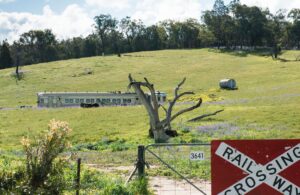
It was a Budd railcar – still recognisable – a silver cigar-shaped carriage sitting out in the middle of this field.
In 1950, the first of three Budd diesel powered rail cars was bought by Commonwealth Railways for use in the Iron triangle of South Australia. I remember being on one of its first trips between Port Pirie and Port Augusta. For a young boy, this gleaming motor train with its rippling silver stainless steel frame shouted “I’m American” and resembled the Pullman cars that were featured in American films and magazines at the time, albeit without a locomotive. It was very exciting. I almost thought I would see a man in a peaked cap and appropriate livery there to assist us onto the car. In the American films of the time they were always black men. This was well before Afro-American replaced the subservient descriptions of the slave state.
Three rail cars were shipped to South Australia, manufactured by the Budd Rail Company in Philadelphia. The rail cars were said to be able to attain speeds of 90 mph, and I remember that day in May 1951 climbing aboard, and finding myself hit by cold air. Air conditioning is taken as a given in today’s world, but not in 1951.
There were two compartments, originally with the luxury of padded seating for forty-nine and forty-one respectively, buffet facilities being fitted still enabled 70 people to be accommodated.
The reason I was on this train was that it was the link service which enabled us to join the “Ghan”, the train originally named after Afghan camel drivers that worked across the Territory. The train travelled between Port Augusta and Alice Springs. The contrast between the slick Budd railcar and the venerable steam train labelled the “Ghan” was amazing as though one was climbing back into a past century. In those days, the “Ghan” wended its way through the Flinders Ranges and then North through the desert, but through that part of the Simpson desert which was liable to flash flooding.
The rail cars because they were swift and relatively noiseless and ran on the unfenced railway also had a propensity of striking wildlife, in particular kangaroos. Twice on level crossings the rail car tangled with trucks, and on one of these occasions the rail car driver was killed.
Four of the cars were built under licence in Australia for NSW railways later, but by the 1990s all the rail cars had been retired.
One obviously ended up on this property, but it only shows there is always something around to remind you that you have been on this planet far too long.
Roger Dunn
He was my oldest friend, but our pathways deviated far away from one another. It was in the past few years when these now old men re-started the relationship we had at school. Some of the magic which is deep friendship remained. Roger was a successful scriptwriter for shows like Bellbird, The Sullivans, Homicide. He was a great watcher of human frailty, even though probably a bit too much was seen through the bottom of a wine glass.
He was not a bad artist and learnt part of his trade from John Brack who, for a time, was our art teacher. The ever-alert Roger noted that Brack had a separate room into which he would vanish, often with a young lady; in the romantic parlance of Dunn at the time this room was dedicated to our teacher’s trysts. I was too naïve to notice. After all, ours was a boys’ school.
Anyway, Brack found time to do a pen and ink caricature of Roger which now has pride of place at the school.
I penned this piece below which Roger’s eldest son, Lachlan read at his funeral last week.
Name?
Roger McLeod Dunn, Sir
Two small boys stand forever captured in navy blue shorts and butcher blue shirts, unbuttoned blazers; but not forgetting the cap on head. From home to school and cheering events, the cap jammed on head was the essential ingredient for everyday living.
Two small boys living close to the same railway line. Trains thundering past – a mutual lifeline to wild distant lands of Kooyong, Darling and Jordanville.

Two small boys joined by their love of words. Once they both entered a competition at school – one with delicate touch described the feathery fairy penguin; the other wrote about the awkward grumpy cassowary. The boy with the light touch won, the youngest ever winner of that prize.
The two boys endured that school; had a friendship held together by that love of literature where even in daytime they both could see the stars.
Vale good friend. The fairy penguins will be dancing with you.
And you? John Barton Best, Sir.
Mouse Whisper
The guy from Old Man Gunyah Creek said as the vehicle passed by the hill, the afternoon sun casting a sheen on its purplish-blue colour: “You know,” gesturing towards the hill, “It is always a matter of perspective. Some call it the Riverina bluebell, while others – Paterson’s curse.”
Having been in England in early spring where bluebells dot the country often in the dappled shade of trees with their new foliage, it is a sight immortalised on many a painted teacup. From a distance, you might gain a similar impression as you drive through the Australian countryside, especially where the weed may be seen growing in gullies shaded by gum trees.
Obviously, Jane Paterson thought so when she bought cuttings back from Blighty in the 1880s to plant in her garden on the family property. She did not think it a weed.
Then the weed escaped. Mrs Paterson’s name is not recorded among our female pioneer heroines.
For Australian farmers who have experienced the spread through much of the East Coast and Tasmania, it is Paterson’s curse. It can be used as fodder, by animals with a rumen, but it caused consternation by those driving by when they saw a number of horses in a large patch seemingly feeding on it. It can kill horses.
However, as a footnote there is a suggestion it was not her fault -well not totally. The number of phenotypes found here are greater than found in Blighty; but sorry that does not let her off the hook.
Somebody had to be the first. Oh, I remember it is success which has many authors, but then I remember – the weed has another name. Salvation Jane.
